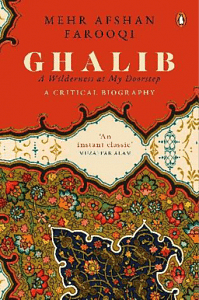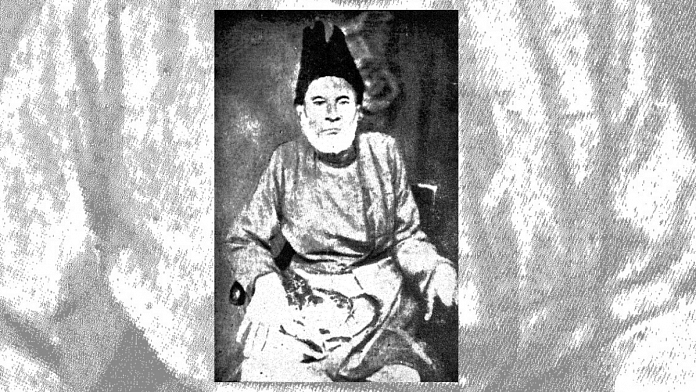After all attempts to get his just share from Navab Ahmad Bakhsh Khan failed, Ghalib undertook the long, arduous journey to Calcutta to present his pension case before the British Governor General. This journey was a big turning point in his career for several reasons. The most important was the change from writing poetry mostly in Urdu to writing in Persian. The second was his exposure to a world more cosmopolitan than Delhi. He now had opportunities to meet Iranians and people from Central Asia who were in Calcutta for trade and diplomatic purposes. The literary gatherings in Calcutta were not of the courtly type: instead, the ambience tilted towards a greater openness, with more freedom to disagree. Print was in evidence, in pamphlets and newspapers, its effect quite palpable. Separation from his familiar haunts in Delhi and north India prompted Ghalib to write many letters describing what he saw and experienced. The letters, written in Persian to friends, relatives and acquaintances, constitute a valuable archive that shines light on the north Indian literary culture in the first quarter of the nineteenth century.
From our perspective, the most significant outcome of the journey was Ghalib’s intikhab of his Urdu and Persian poetry, the Gul-e Ra’na and its dibachah. This selection, as we shall see, formed the basis of his choice for the Urdu Divan of 1841. The other remarkable products of the journey were two masnavis in Persian. The first was Chiragh-e Dair (Lamp of the Temple), regarded as the finest poem of its kind on the allure of India’s Mecca, Banaras; and the second, Bad-e Mukhalif (Adverse Winds), was a sharp retort in verse, deriding the rude behaviour of the Calcutta audience. Ghalib initially called it (ironically) Ashtinamah (letter of conciliation); he published it as a pamphlet and claimed that it had reached 5000 people.
Ghalib arrived in Calcutta on 19 February 1828.
When we think of the challenges of a 3000-kilometre journey that was interrupted by long episodes of illness (five months spent recovering in Lucknow, six months in Banda, one month in Banaras), we have to admire Ghalib’s tenacity of purpose. It almost seems like a miracle that he reached his destination. Meanwhile, Ghalib kept pouring his heart out in letters. He wrote Persian in an elaborate but emotional style, creating a wonderful archive of the sojourn in elegant prose. From his letters, we learn that in Calcutta he rented a comfortable house that was amenable in every way. It had a big courtyard, a well with sweet water, a delightful room on the terrace and a spacious lavatory! The rent was a mere Rs 6 per month. The address was: Haveli of Mirza Ali Saudagar, Gol Talab, Shimla Bazaar. Calcutta’s vibrant ambience made a deep impression on Ghalib’s alert mind. He wrote to Mirza Ali Bakhsh Khan:
Calcutta is remarkable! it is a world where everything except a remedy for death is available. Every task is easy for its talented people. its markets have an abundance of everything except the commodity of good fortune. My house is in Shimla Bazaar. I was easily able to find a house within a day or two of arriving here. In short, it is God’s grace that a careless one like me, who had awakened from a deep sleep, and who went to the durbar without washing his face, was given a place in the heart of the rulers, and was awarded a position higher than I expected in the assemblies. I was blessed with a kind-hearted mentor, a member of the Council, Mr Andrew Stirling, who is willing to listen to the plea of this broken-hearted one and put healing ointment on his wounds.
Also read: A birthday tribute to Mirza Ghalib, the poet who took Urdu to the zenith of glory
It didn’t take Ghalib long to establish himself among the important people in the city. He travelled to Hugli (Hooghly) by boat to pay his respects to Navab Ali Akbar Khan Tabataba’i, who received him cordially and soon became a friend. On 28 April, armed with a freshly composed qasidah, Ghalib called on Andrew Stirling, Persian secretary to the Governor General, and apprised him of the pension case. Stirling had a taste for fine Persian poetry and was soon among Ghalib’s well-wishers. Next, Ghalib called on Simon Fraser, officiating secretary to the Governor General, who greeted him cordially by rising up to receive him, and even offered him perfume and betel leaf, the customary welcome for friends. Fraser had known Ghalib’s uncle, Nasrullah Beg Khan. Ghalib submitted his petition to Fraser, feeling quite optimistic about the outcome.
Meanwhile, Mirza Afzal Beg, the brother-in-law of Khwaja Haji, had been busy spreading canards about Ghalib.Beg had been appointed to the post of vakil, or agent, of Emperor Akbar Shah II, in September 1827; he had arrived in Calcutta much before Ghalib. Afzal Beg, who wielded considerable influence in the official circles, began to spread the story that Ghalib was an unreliable man who changed his pen name every now and then. It is well known that Afzal Beg made every effort to malign Ghalib among the religious scholars and literati of Calcutta.
Over the year and a half in Calcutta (February 1828 to August 1829), Ghalib had led a life that oscillated between the highs and lows of literary and social experiences. The most energizing moments perhaps were the monthly mushairahs attended by the literati of various persuasions, from Persian and Urdu backgrounds. in Ghalib’s Delhi, mushairahs were dominated by Urdu poets. Here in Calcutta was an opportunity for Ghalib to flaunt his (self-proclaimed) native fluency in Persian. But the path was not smooth. A small but significant factor was the indirect involvement of Ghalib’s adversary, Afzal Beg, in these mushairahs. Afzal Beg was connected to Munshi Abdul Karim of the governmental Persian department, who was influential in literary circles and active in the organization of the mushairahs that were held on the first Sunday of every month. Ghalib’s experience of his first mushairah, in June 1828, was positive. The ghazal that dragged him into a raging controversy was the one he composed for the second of these mushairahs, which he attended on 8 July 1828.
Ghalib composed a ghazal on the proper pattern-line (which, as usual, had been specified beforehand) and presented it at the mushairah. in the following week, news began circulating that one of Ghalib’s verses was grammatically flawed.
Also read: Syed Ahmad Khan’s book on Delhi and its ruins would ‘numb’ other writers, said Mirza Ghalib
Navab Akbar Ali Khan and Maulvi Sirajuddin Ahmad advised Ghalib to maintain his equilibrium and apologize to the Calcutta poets. While Ghalib does not mention the names of his detractors, except Afzal Beg, further research into this incident has revealed the names of two or three others. Maulana Abul Kalam Azad tracked them down. The episode triggered a series of pamphlets and some columns in the weekly Persian newspaper Jam-i Jahan Numa. Ghalib was advised by his friends to patch up. He wrote the Ashtinamah by way of reconciliation; it was printed and distributed as a pamphlet. But the anger, distress and pain of his peers’ criticism haunted Ghalib even after he had poured it out in poetry. Certainly, the Ashtinamah is a piquant poem, passionate and pain-filled. it can be interpreted literally, or with some allowance for rhetoric.
The Calcutta chapter in Ghalib’s life planted the seeds for his prolonged clashes with critics and his lifelong series of victories and defeats in these linguistic wars. From belittling Indian poets of Persian, he went on to denigrate Indian lexicographers. His letters are full of harsh, unsavoury comments about Indian poets, especially Qatil. Ghalib’s onslaught on Indian Persian reveals a deeper layer of insecurity that afflicted the nineteenth-century Urdu-Persian literati. As Shamsur Rahman Faruqi shows, the decline of Persian learning went hand in hand with the valorization of native Iranians over Indian writers.
Upon his return from Calcutta, his mind was made up regarding his future path. He was going to be the leading exponent of Persian in India.
 This excerpt from ‘Ghalib: A Wilderness At My Doorstep’ by Mehr Afshan Farooqi has been published with permission from Penguin Random House India.
This excerpt from ‘Ghalib: A Wilderness At My Doorstep’ by Mehr Afshan Farooqi has been published with permission from Penguin Random House India.



